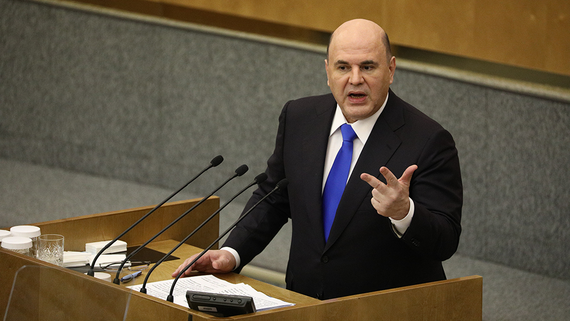Mishustin estimated spending from the budget and the NWF on the plan to support the economy in 2022
[ad_1]

Last year, only 1.5 trillion rubles were allocated from the budget and the National Wealth Fund (NWF) to implement the plan of priority actions to ensure the development of the Russian economy under sanctions last year. This was announced by Prime Minister Mikhail Mishustin, speaking to the State Duma with a report on the work of the government in 2022.
“Significant funds were directed to the implementation of the plan. Only direct support from the budget and the National Wealth Fund amounted to about 1.5 trillion rubles. Under various programs of concessional lending to companies – almost 4 trillion rubles more. And that’s not counting guarantees. VEB.RF by about 1 trillion rubles,” he said.
In addition, loans were restructured at floating rates and under the programs of the Central Bank for 6 trillion rubles, the prime minister added.
In total, the plan included more than 300 events from more than 33,000 proposals. Thanks to the implementation of the proposed measures, it was possible to solve operational problems. And by June, the impact of negative factors was significantly reduced, and by the third quarter, the Russian economy came out with a certain “margin of safety,” Mishustin emphasized.
Against the backdrop of the introduction of Western sanctions due to the military operation in Ukraine, the Russian government in the spring of 2022 announced a number of new measures to support business and the country’s economy. In particular, a moratorium was introduced on inspections of SME and IT companies, the conditions and procedure for public procurement have been simplified, it has become possible for the Cabinet of Ministers to carry out additional indexation of insurance pensions, the pension coefficient and additional payments to pensions. In addition, credit holidays were introduced, the procedure for purchasing medicines was simplified, the authorities introduced several measures to support the IT industry, etc.
In his speech today, Mishustin said that last year the country suffered the strongest sanctions strike in its modern history. The decline in national GDP, inevitable under the current conditions, turned out to be quite moderate, while now the economy has been returned to a growth trajectory.
On February 10, the Bank of Russia updated its medium-term macro forecast, improving estimates for the economy this year. According to the regulator, the dynamics of GDP will be in the range from minus 1% to plus 1% (in the previous version of the forecast, the Central Bank expected a decline of 1-4%). At the same time, the estimate for next year has been downgraded to an increase of 0.5-2.5% compared to 1.5-2.5%.
According to the current forecast of the Ministry of Economic Development, in 2023 the Russian economy will decrease by 0.8%, and in 2024 it will grow by 2.6%. Inflation at the end of this year is expected at 5.5%, and the government expects it to return to the target of 4% in 2024. Investment in fixed assets will decrease by 1% in 2023, real disposable income will grow by 1.6% follows from the forecast.
[ad_2]
Source link






